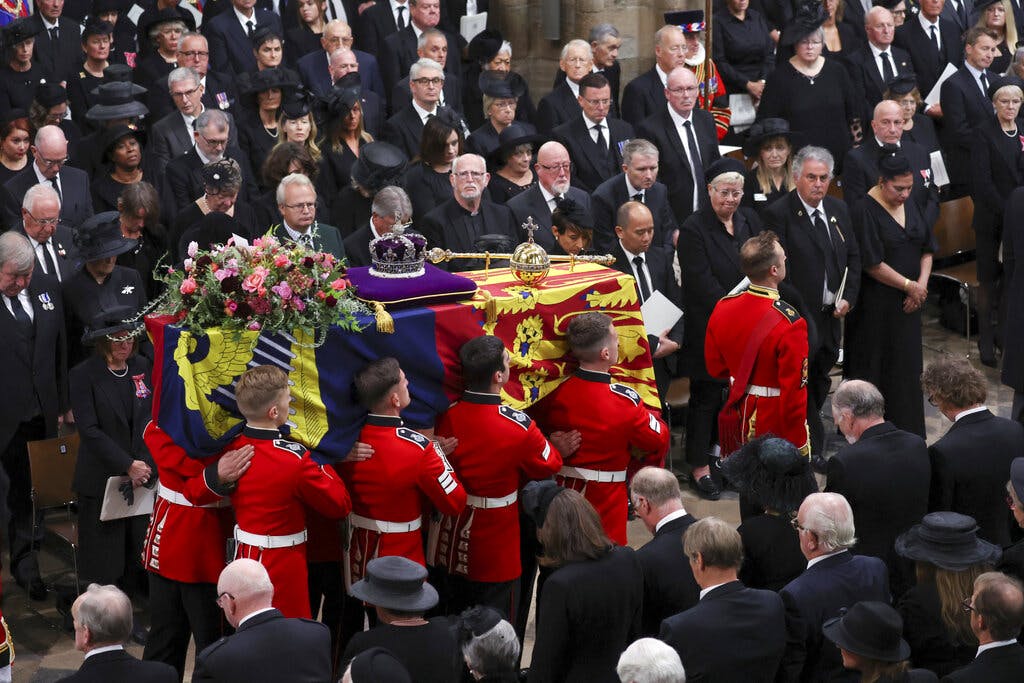The Secret Elizabeth Will Take To Her Grave
The state funeral today is the last public rite before the late Queen is interred at Windsor Castle.

“As we prepare to say our last farewell, I wanted simply to take this opportunity to say thank you,” Charles III allowed Sunday evening. My wife and I, he added, “were moved beyond measure by everyone who took the trouble to come and pay their respects to the lifelong service of my dear mother, the late Queen.”
Today the world witnesses the state funeral for Elizabeth II. The United Kingdom has been in mourning since her passing on September 8. For the last fortnight, the country has been in a curious state of pause. Life continues, as it must. At the same time, its pace has slowed. A transition is in process.
With the death of the Queen of the Royal Commonwealth, citizens of the member countries have become more reflective. Many will ruminate on the fact that their Head of State for more than 70 years is no more. Some will dare consider the “republican” prospect and life without royalty.
Few of us have ever met Elizabeth II. We know her less as “Queen” — her regnal role as Head of State is purely abstract — than as a maternal figure, a neighbor, perhaps, with whom we have all grown up. Our mourning takes on aspects of the surreal. Not even the Royal Family itself is immune.
Charles III has the additional burden of bearing the death of his mother while taking upon himself the duties of monarch. Already the King has addressed the nation, eulogizing Elizabeth’s 70 years of service and vowing to follow in his mother’s steps. Charles made a “royal progress” through the constituent nations.
That is, through Scotland, Wales, and Northern Ireland, in union with England. Such was a novel — and shrewd — move at the death of one monarch and the accession of another. Local dignitaries spoke words of sympathy at Queen Elizabeth’s passing, and proclaimed their loyalty to the new king.
More importantly, Charles went out among the people at Edinburgh, Hillsborough, and Cardiff. Surprises were reserved for his time at London, where the King stopped outside the gates of Buckingham Palace to greet the crowd, where he was kissed on the hands and, incredibly, on the cheek — quite a departure.
Yet the King took it in his stride. On another occasion, Charles, accompanied by Prince William, went out to greet the lines of people, queuing to pay their final respects to Elizabeth II lying-in-state at Westminster Hall. Even moments of sadness are leavened with humor, giving rise to “pengate.”
This was Charles reacting, at the Accession Council and at Hillsborough, with facial irritation and exasperation — and a flicking of the royal wrist — at an effort to proffer to him a tray of leaking writing instruments. Instead, he unscrewed the cap of his own regnal writing device.
Sunday night, King Charles met with near 500 world leaders at Buckingham Palace, who had flown to London for the state funeral. Such a funeral — with its pageantry and pathos and liturgical glory— is reserved for the monarch, and those exceptional commoners, Wellington, Gladstone, and Churchill.
Following services at Westminster Abbey, the Queen’s coffin will proceed to Windsor Castle for a private service at the Chapel. An end to a very public period of loss; the Greeks called it “catharsis.” While official mourning in the UK will continue until next Sunday, life resumes again on Tuesday.
By week’s end, the Conservative Government will have presented its plan to provide targeted energy subsidies and a “mini Budget” in response to the cost-of-living crisis. It will be inevitable, in these uncertain times. that people will look to the King for “signals” to his thinking. He must eschew the temptation.
The activist prince must give way to the patriot king. Nothing less than the future of the monarchy depends on his actions in these fateful first days and weeks ahead. To King Charles will fall the “stewardship of sovereignty,” and the fact that Elizabeth kept so close — “uneasy lies the head that wears a crown.”
BrexitDiarist@gmail.com

